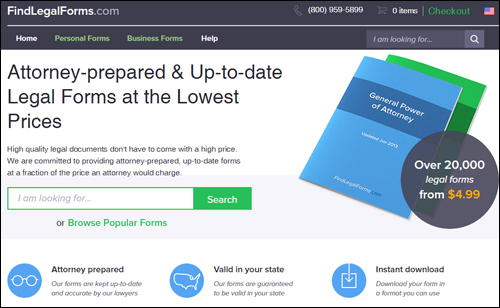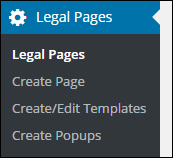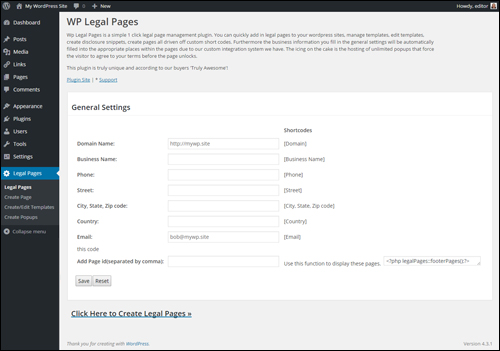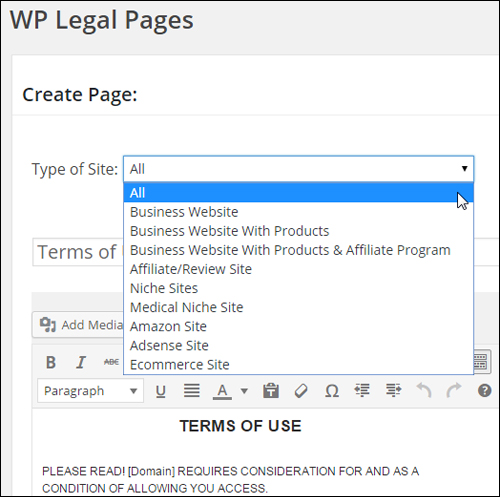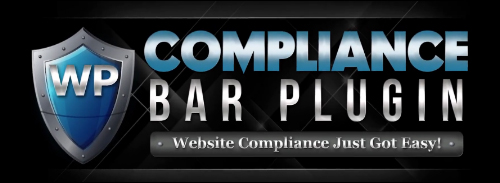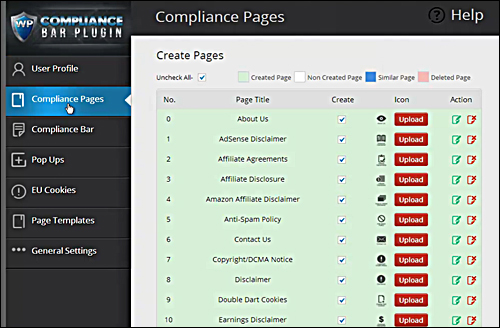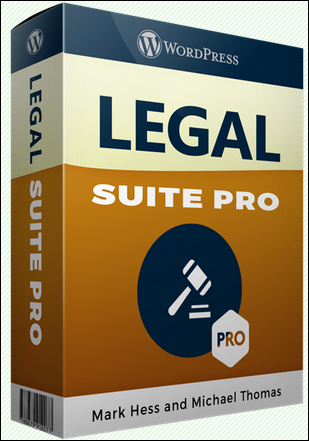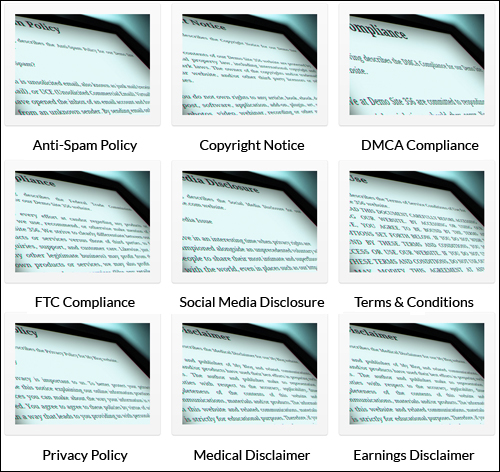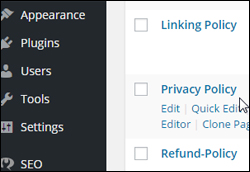
Is your website legally compliant? Do you know if your site is breaking the law, or contravening the Terms of Service (TOS) of any companies whose services or products you do business with?
Online laws, regulations, and guidelines are designed to protect consumers and apply to anyone who markets, sells or promotes goods or services online. Anyone who owns a website risks being sued for not following compliance laws. Feigning ignorance about legal requirements won’t excuse you from being slapped with a legal notice.
Recent laws introduced in 2014 to regulate how businesses promote advertising on their sites clearly state that if you plan to promote anything on your site for profit, then you need to follow certain disclosure guidelines to prevent enforceable orders being issued against you by consumer protection agencies, such as the Better Business Bureau (BBB). Search online “The Online Interest-Based Advertising Accountability Program,” which regulates behavioral advertising across the internet for more details.
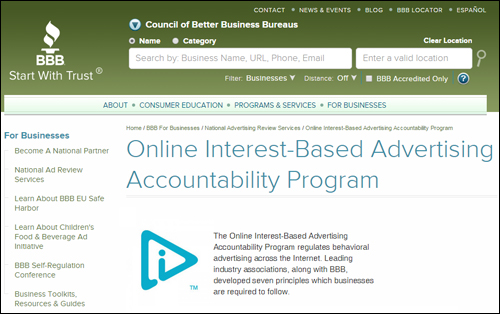
(Better Business Bureau)
The introduction of these new laws affect several business categories, including:
- Any form of advertising, including Google AdWords or AdSense
- Retarget Marketing
- Google Analytics (or other analytics software)
- Affiliate Marketers
- Product Creators
- Bloggers
- etc.
If your website does not display certain legal pages (e.g. terms of service, privacy policy, earning disclaimers, etc.), many third-party sites such as Google won’t let you advertise, online merchants like ClickBank or JVZoo will not allow you to list digital products on their network, PayPal could suspend your account, Facebook could suspend web applications, and you will not be allowed into a number of advertising and online merchant networks.
If your website is not compliant, you could end up facing a whole range of penalties, including fines, having your website shut down, even jail time!
The purpose of this guide is to make you aware that your site may be subject to certain legal requirements according to laws that govern online business practices, the importance of remaining compliant with the terms of service of other providers whose products or services you may be endorsing on your site, and that there are plugins for WordPress website owners that can help your online properties become fully compliant, such as the plugins listed further below.

Is Your Website Breaking Rules Or Regulations?
![]()
Legal Disclaimer: We are not lawyers and we cannot provide legal advice in this article. As stated previously, this article is designed only to make you aware that your website may be subject to a number of legal policies in accordance with federal, regional or local laws that govern business practices online and that compliance may be required with the terms of service of third-party companies whose services or products you use on your website or blog
Why Ensuring That Your Website Is Compliant Is Important
Consider what could happen to your business if any of these scenarios were to happen:
- A person suffers a cardiac arrest after using your online fitness program.
- The skin cream you sell as an affiliate gives people skin rashes.
- You’ve let your subscribers know that you will not sell their information, but you have not clearly informed them what you will do with the information you’ve collected.
- Someone copies content from your website and puts it up on their website.
- There is no statement on your website or blog making your site visitors aware that you are an affiliate for the product you’re selling that you may derive an affiliate commission if visitors purchase it.
- You didn’t spell out the terms and conditions of your return policies.
- A visitor claims your testimonials are misleading and tries to sue you.
- You didn’t disclose in a product review that you were given a free copy of the product.
- Your website publishes adult-related content and you have not taken sufficient measures to keep underaged persons from accessing it.
Consider too these documented examples of costly compliance breaches:
- A CPA Marketer failed to provide adequate disclaimers telling visitors they would have to give up personal information (including credit card information to complete his offer. In addition to a significant $390,000 fine, he is now required to provide everyone he does business with for the next 20 years, a copy of the judgement — including employees.
- A social networking app developer was slapped with a whopping $800,000 fine for collecting personal information from mobile device address books without the owners’ knowledge and consent – including storing private information about children.
- Facebook’s Terms Of Service does not allow users to scrape Users IDs. Many marketers took a risk and lost. Their accounts were shut down, resulting thousands of dollars in lost revenue.
- An independently-conducted study by Brad Geddes of SearchEngineLand, showed that, of a couple of hundred randomly-picked websites, more than 90% had infringed at least one of Google’s policies, more than 65% were in breach of at least 2 of Google’s policies, and more than 40% had broken at least three of Google’s policies. Although the website owners could technically be sued by Google, more than likely what could happen, is that they would be issued with warnings or lose access entirely to the Google program with the violation, which could result in loss of income (e.g. AdSense or AdWords).
Can you see how easy it is to become exposed to the risk of litigation?
Regardless of whether you are a:
- CPC (Cost Per Conversion) Marketer
- Network Marketer
- Affiliate Product Promoter
- AdSense Publisher
- Product Marketer
- Amazon Associate
- e-Commerce Store Owner
- Publisher Of Adult Content
- Provider Of Freelance, Coaching Or Consulting Services
- Seller Of Any Service Or Product Online
It’s vitally important to do whatever is necessary to make sure that your digital presence has the right legal pages and information displayed to site visitors.
Complying With Third-Party Services - ToS, Policies, etc.
Leading online companies and government trade regulatory agencies emphasize the need of complying with the terms and policies of third-party service providers.
You must let your site visitors know that your website complies with all necessary legal requirements and recommended guidelines. This not only increases consumer trust and buyer confidence in your site, it’s also required by most companies you interact with.
For example:
Google requires you to display certain information when using their services or features. This includes using Google Analytics …
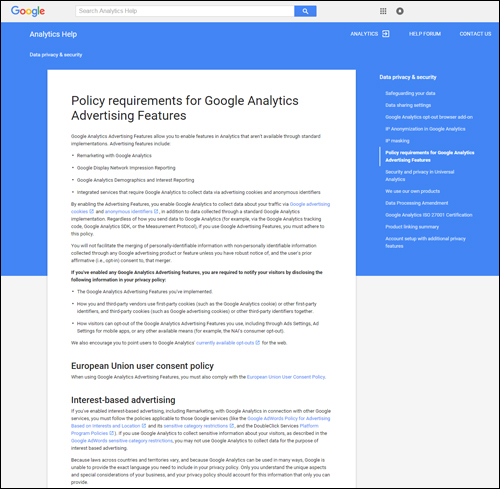
(Google Analytics – Policy Requirements)
Generating revenue online with your website using Google AdSense …
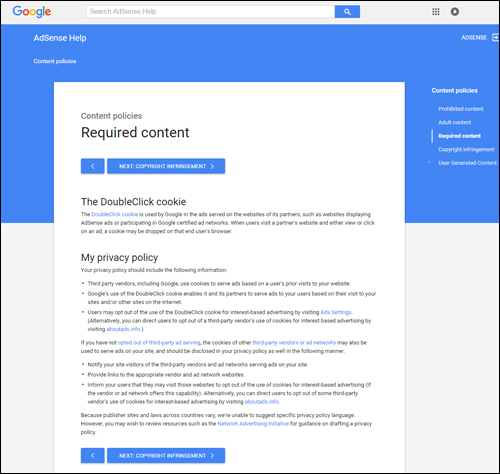
(Google AdSense policy requirements)
Or promoting your site via Google AdWords …
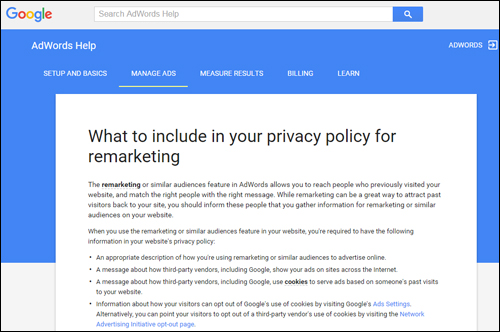
(Policy requirements for using Google AdWords)
If you sell information-based products with places such as ClickBank, JVZoo, or other established online merchant sites, you will need to add a number of legal pages to your website before your products can be approved for selling via their network …
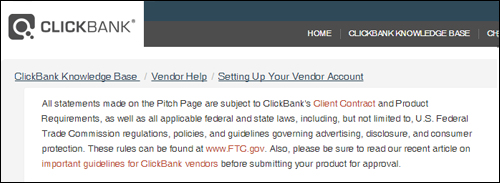
(Policy requirements digital product vendors selling via ClickBank)
The Federal Trade Commission (FTC) also requires you to include clear disclaimers and policies to visitors, especially when concerning the use of testimonials or product endorsements …
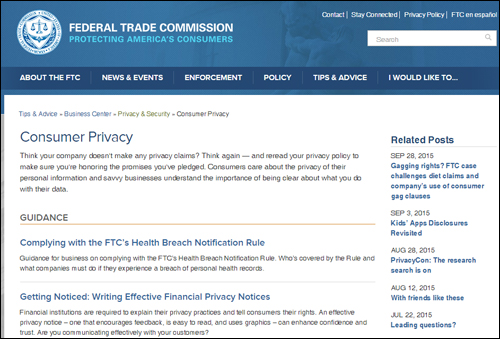
(FTC – consumer policies and regulations)
FTC Regulations – Ensure That Your Site Is Compliant
FTC regulations governing how business is conducted online were introduced in March 2012. A quick search online reveals that many sites are still unaware (or choose to flaunt) these requirements. As has happened in the past, this typically ends up with the FTC making an example of businesses and prosecuting website owners in an effort to get other businesses to comply.
If you plan to do any type of selling online, therefore, it’s best not to take chances. Even if your business does not operate in the U.S. it’s best to protect your business interests by ensuring that your website is compliant with all FTC guidelines.
You can find many resources sites for businesses that can provide guidelines on how to structure disclaimers and disclosures to help you comply with FTC requirements. We provide references to some of these at the end of this article …
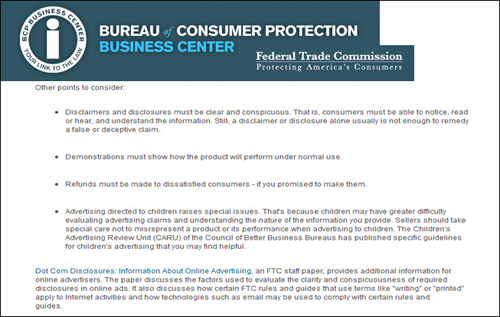
(Structuring your disclaimers and disclosures correctly is important to avoid running foul of laws and regulations)
Social Media Apps - Don’t Forget These
If you plan to develop apps for your site users, you will also be required to provide sites like Facebook, Twitter, and others with information about your legal pages …
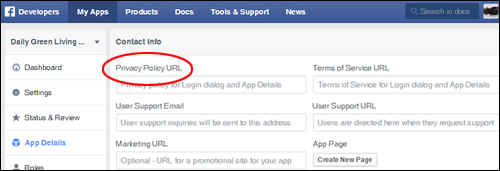
(Social networking apps also require compliance)
![]()
- If you are unsure whether or not you are breaking the law, and/or Terms of Service policies and guidelines of service providers like Google, Facebook, etc., then it’s best to assume that you most probably are.
- If you are considering promoting anything on your site as an affiliate marketer, or generating revenue online with Google AdSense, Amazon, or eBay advertising, or use Google AdWords pay-per-click ads to drive visitors to your pages, etc., then find out exactly what kind of legal information you are required to display on your site to comply with all Terms Of Service and policy requirements - don’t risk having your accounts shut down.
- If you have ever wondered whether “borrowing” a Copyright Notice is Copyright infringement, then it’s best to take proper precautions to avoid becoming a litigation magnet.
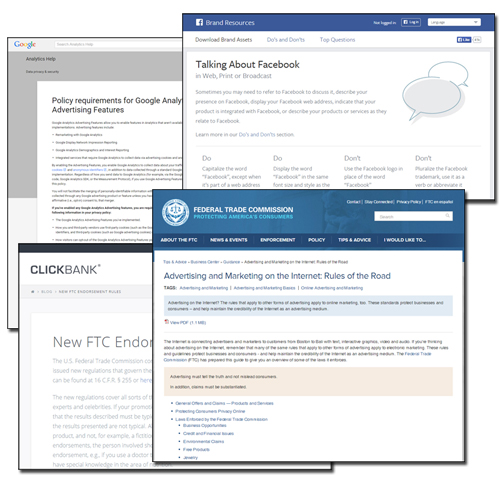
(In addition to legal and regulatory compliance, most 3rd-party services require you to comply with their policies)
What Compliance Information Do I Need To Add To My Site To Be Legally Compliant?
If you suspect that your web site is lacking in areas of compliance, then you will find this section helpful.
At its most basic, adding the following legal pages to your site should help your site stay out of trouble with many regulatory authorities and 3rd-party providers, and even help you avoid possible legal issues):
- About Us Page
- Contact Page
- Privacy Policy
- Terms Of Use
- Disclaimer Pages
- General Data Protection Regulation (GDPR) Compliance
Additionally, you may want to consider adding one or more of the following pages if applicable:
- Affiliate Disclosure (e.g. if you provide information about affiliate products or services)
- Anti-Spam Policy
- Compensation Disclosure
- External Linking Policy
- Health Disclaimers (e.g. if your website provides general health or medical content)
- Refund Policy (if you sell products or services online)
- Use Of Media (if you provide users with access to downloadable videos or audio files on your site)
Types Of Disclosure Pages
Adding the right disclosure information to your site is important. For example:
- No Material Connection – This lets users be aware that you are not being paid for writing the post.
- Affiliate Links – Lets your visitors be aware that you will derive some form of financial benefit if they buy through your affiliate link.
- Review Or Sample Copy – Lets readers be aware that you have received a review or sample copy of the product by the author or product developer.
- Sponsored Post – Lets site users be aware that you were compensated in some way to write the article.
- Third Party Advertising – Lets visitors know that you’re using online behavioral tracking technology. This is required to satisfy the “enhanced notice” the Better Business Bureau has been requiring online publishers to display prominently on their sites since January 1, 2014.
Adding Legal Content To Your WordPress Website
Ideally, you should have your lawyer prepare the verbiage of your legal documents. Once you have this, there are several ways to add them to your website.
Upload Legal Pages Manually To Your Website
If someone prepares and delivers the legal content for you in HTML format, you can simply upload these to your web server, or have someone upload them for you.
We recommend creating a legal directory on your server and uploading HTML pages containing your legal documentation to this folder (e.g. via FTP) …
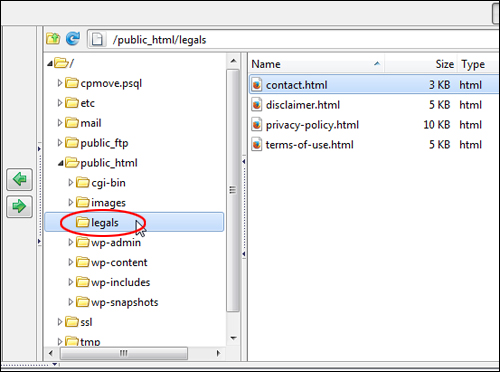
(Upload legal pages to your web server using FTP)
You can then add a link to these pages from your WordPress site using a custom WordPress menu …
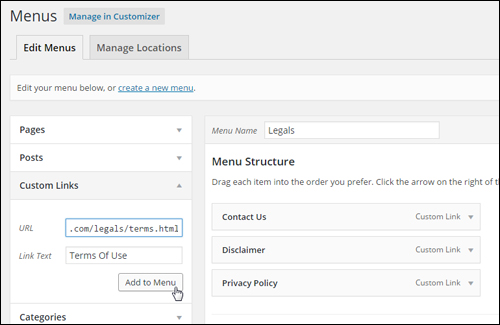
(WordPress Menu)
Displaying Legal Web Pages On Your Website
Make sure that your legal pages are up-to-date and clearly visible to your visitors. You can add these to the sidebar (or the footer section of your site) so that users will be able to access the information from every page …
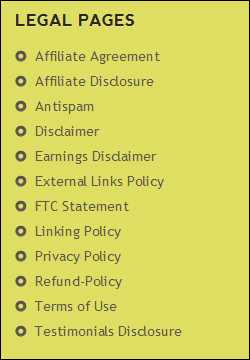
(It’s important to display links to legal information to users on all of your site’s pages)
To learn more about adding links to pages on your sidebar or footer menu, refer to this step-by-step tutorial:
Ready-Made Legal Templates
You can find downloadable attorney-drafted internet forms and agreements just by searching online, or by going to websites like this one:
Find Legal Forms
To learn more, visit this site:
Another option is to download a set of cut & paste website legal templates drafted by legal attorney Scott Talbert …
Cut & Paste Website Legal Pages
(Scott Talbert’s Legal Forms)
Cut & Paste website legal pages were created by an attorney and feature less passive voice and more plain language phrasing and can be easily customized with search and replace to add your own details, then pasted into your legal pages.
The legal forms included in Scott Talbert’s Website Legal Templates include:
- Anti-Spam Policy
- Copyright Notice
- Disclaimer
- DMCA Compliance
- Federal Trade Commission Compliance (This proprietary FTC page reflects new Federal Trade Commission guidelines that came into effect in 2012)
- Privacy Policy: Google, DART, etc.
- Terms of Service & Conditions of Use.
You can either create a new page for each legal form you want added to your website, then paste the content from the templates into your pages and publish or upload these to your web server as previously described.
More info:
Legal Pages – WordPress Plugins
As well as using templates, another option for adding legal pages to your site is to use WordPress plugins.
Here are some great legal plugins for WordPress websites and blogs you may be interested in using:
WordPress Legal Pages
(WordPress Plugin – WP Legal Pages)
If you don’t want to bother with creating legal web pages manually, then consider using a plugin like WP Legal Pages instead …
This plugin is not free, but it’s a low-priced and well-supported plugin that will help make the work of creating and implementing legal pages on your site much easier and save you time.
Here are just some of the benefits of using WP Legal Pages plugin:
- Pre-written Templates – Over 20 built-in legal templates created by a team of professional lawyers.
- Very Quick And Easy To Use – You can set up most of your basic legal pages in around 3 minutes with a few clicks of the mouse.
- Fully Customizable Pages – The plugin includes customizable and easy to edit legal form templates (e.g. ToS, Disclaimer, Earnings Disclaimer, Privacy Policy and more!)
- Easy To Edit Pages – Full WYSIWYG editor lets you edit legal pages just like any other page on your site.
- Custom Shortcodes Integration – Add shortcodes to your WordPress pages and the information will be automatically inserted into your content when published.
- Exclude pages. Exclude pages from menus with a simple checkbox and delete and manage these like any WordPress page.
- Forced Options – Force page lock down. When users agree to your terms, the page unlocks, giving them access.
- New Features – The plugin is updated with new features when new versions are released.
When you install WordPress Legal Pages, a new menu feature will display inside your main dashboard area …
(WordPress Legal Pages – Menu)
This lets you view, create and edit your legal pages from the admin area …
(WP Legal Pages Plugin – Settings)
The plugin gives you the option to create legal pages for different online uses, such as business websites, niche websites, e-commerce sites, etc …
(WordPress Legal Pages Plugin For WordPress – Create different legal pages)
Choose from various built-in legal templates …
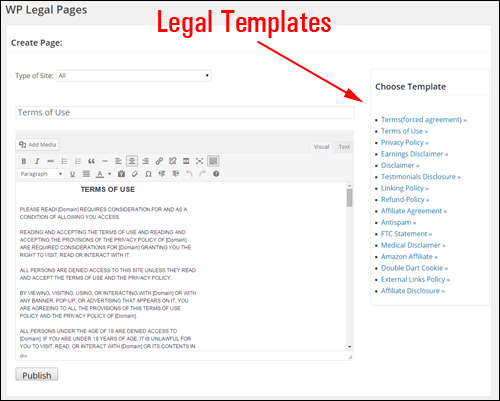
(WordPress Legal Pages Plugin – Built-In Templates)
Legal page templates include:
- Terms of Use (Users are forced to agree to Terms and Conditions before using site)
- Linking Policy
- External Links Policy
- Terms and Conditions
- Refund Policy
- Affiliate Disclosure
- Privacy Policy
- Affiliate Agreement
- Facebook Privacy Policy
- Earnings Disclaimer
- Antispam Policy
- DoubleClick DART Cookies Policy
- Disclaimer Template
- FTC Disclosure Statement Template
- Medical Disclaimer Template
- Testimonials Disclosure – As per FTC guidelines
- Amazon Affiliate Disclosure Template
- DMCA Policy Template
- California Privacy Rights Policy Template
- Digital Goods Refund Policy Template
- COPPA – Children’s Online Privacy Policy Template
- Blog Comments Policy Template
- Newsletter Subscription Policy and Disclaimer Template
- FTC Disclaimer Widget
Visit this site to learn more about the benefits of using this powerful plugin:
Compliance Bar – WP Compliance Plugin
Compliance Bar is a simple WordPress plugin containing over 20 customizable compliance pages for your online business …
To learn more about the plugin go here:
Legal Suite Pro
(Legal Suite Pro For WordPress)
Legal Suite Pro Plugin For WordPress lets you easily install professionally-written legal pages such as:
- Anti-Spam Policy
- Copyright Notice
- DMCA Compliance
- FTC Compliance
- Privacy Policy
- Social Media Disclosure
- Medical Disclaimer
- Terms & Conditions
- Earnings Disclaimer
(Legal Suite Pro Plugin For WordPress – Professionally-written legal forms)
Additionally:
- Drag & Drop FTC Disclaimer Widget: Add an FTC Disclaimer to any WordPress sidebar or widget area.
- Customizable EU Cookie Compliance Bar: Display an EU cookie compliance bar if you are getting traffic from the EU and your sites use cookies.
With just one-click you can install almost all of the legal pages your site needs and these professionally written legal pages can be created in your theme and/or as a standalone page outside of your theme.
The plugin developers secured rights to high quality, professionally written legal disclaimers and packaged them into a plugin that can be installed quickly on any WordPress site. You can have legal pages installed and set up on your site in one minute or less and the plugin licensing is flexible, allowing you to install and use the plugin on all of your websites.
Visit this site for more details:
![]()
If using the services of lawyers to create your legal pages is currently out of your budget, then consider implementing at least some basic kind of legal protection on your website until you can afford to hire the services of a solicitor.
We want your website to be safe!
Download the FREE Legal Pages Generator tool below, or use one of the better solutions we discuss in this article, such as using legal documents, or plugins as described in the section below.

(Legal Pages Generator)
Legal Pages Generator lets you quickly generate basic legal documents for your website including Terms of Service, Privacy Policy, Copyright Notice, Website Disclaimer and Earnings Disclaimer.
***
As stated earlier, if you engage in any form of commercial activity online, it’s important that your site is compliant with legal requirements of government agencies that regulate how business online is done and any terms of service (TOS) and guidelines provided by 3rd-party products and services that you may decide to promote or endorse online. Your website or blog must comply with numerous laws and regulatory guidelines, some of which you may not be aware of.
Being non-compliant puts you at risk of suffering both financial losses and the loss of your reputation. Why risk your money and reputation, when you can protect yourself so inexpensively?
![]()
Legal Disclaimer: Once again, please note that we are not lawyers and we offer no legal advice in this article. Do your own due diligence and consult legal experts about the best way of ensuring that your website fully complies with the law pertaining to your specific business.
Additional Information
Below is a time-saving list of websites we recommend you visit to better understand what may be required of your site to comply and meet its legal obligations:
- FTC Latest List Of Rules & Regulations
- Federal Trade Commission Advertising & Marketing Rules Of the Road
- FTC Advertising And Marketing On The Internet
- Online Interest-Based Advertising Accountability Program – BBB
- Dot Com Disclosures: Information About Online Advertising
- Restore Online Shoppers’ Confidence Act
- CAN-SPAM Act Guide
- Children’s Online Privacy Protection Rule
- FTC Regulatory Review Web Page
- FTC Rules and Guides Currently Under Review
- The Department of Commerce Internet Policy Task Force – Commercial Data Privacy and Innovation in the Internet Economy: A Dynamic Policy Framework
- FTC Staff Report: Self-Regulatory Principles for Online Behavioral Advertising
- FTC Final Guides Governing Endorsements and Testimonials
- US Patent and Trademark Office
- United States Copyright Office
And …
- Google Analytics Help – Policy requirements for Google Analytics Advertising Features
- Google AdSense Program Policies Explained
- Google AdSense Help – Required Content
- Google AdWords – Information Collection And Use
- AdWords Help – What to include in your privacy policy for remarketing
- ClickBank – Creating Your First Product
- Facebook Platform Policies
Hopefully, this article has helped you understand the importance of having a compliant website. Use the information provided above to quickly and easily add legal pages to your website.
***
"I have used the tutorials to teach all of my clients and it has probably never been so easy for everyone to learn WordPress ... Now I don't need to buy all these very expensive video courses that often don't deliver what they promise." - Stefan Wendt, Internet Marketing Success Group

